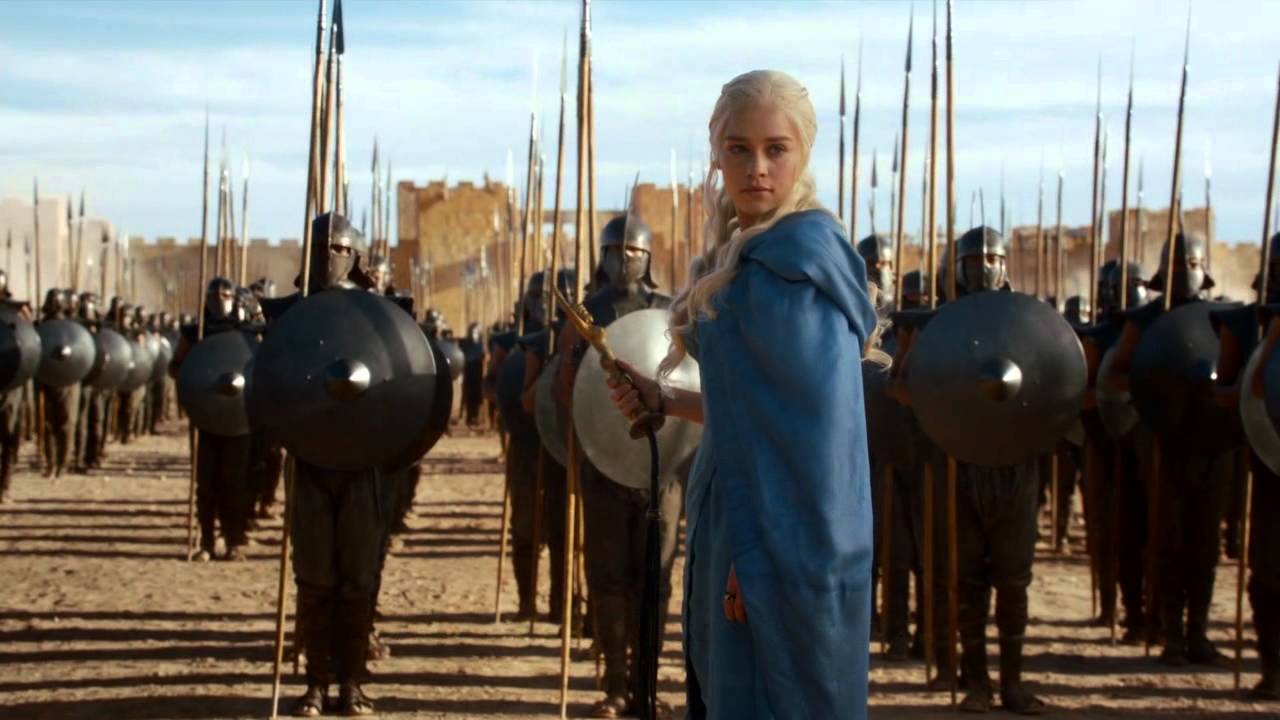You have no items in your cart. Want to get some nice things?
Go shopping
The world of Game of Thrones is so complex and believable that each language spoken in both the books and films fits right in, feeling authentic to Westeros and Essos. When Daenerys speaks High Valyrian in season 3 for the first time to devastating consequence, her compelling effect on both dragons and men is not undermined for a moment by the feeling that she is mouthing gobbledegook.
The numerous geographical locations in HBO’s Game of Thrones each have their own tongue and way of speaking. Author George R.R. Martin mentions “the Old Tongue” and “the Common Tongue” in Westeros, along with a language said to sound like “the crackling of ice,” spoken by the non-human White Walkers of legend; the region of Essos features a plethora of languages, and the character of the professional slave-translator Missandei who plays a major role in the fifth season, mentions that she can speak nineteen languages altogether.
So how did GRRM come up with all of this? The short answer is that he didn’t. In the books, we get just a word or phrase here and there, which fit right in with the situation but are never expanded. Martin has explained that he is not a linguist, so his work on the languages stopped there. The words just came from his imagination.
This is fine for the books and works well, but when it came to the TV series, more detail was needed. Initially D.B. Weiss and David Benioff, the scriptwriters for the series, simply made dialogue up that sounded kind of right. But when actors spoke the lines, it was clear that it sounded unconvincing. An expert was needed to actually create whole new languages, which would be used in the series as High Valyrian and Dothraki.
Luckily, there are people in the world who are able to do just that. Who knew that linguists exist who are so skilled that they can start with a few words and phrases, such as the ones already provided by Martin, and develop them into a fully-realised language system? This is exactly what David Peterson, a scholar of linguistics and president of the Language Creation Society, did. The society members, who are known as “conlangers,” invent new languages as a hobby.
He didn’t get the job by virtue of his position, though; the show’s producer’s held a competition to find the best conlanger for the job. Peterson spent a month putting together a language system for Dothraki using the existing words and phrases from the books, and demonstrating how it would work. The document in the end was 300 pages long, with a useful summary for those short of time.
Once his version of Dothraki was accepted, the language expert set to work on High Valyrian. There was considerably less to go on with this language, however, but the phrases “valar morghulis” which means “all men must die” and “valar dohaeris” meaning “all men must serve” were both useful. Because both phrases end with “-is,” it suggests that “-is” indicates “must.” “I developed the entire conjugation system based on those two verbs,” explains Peterson. “Only when I couldn’t squeeze any more out of the books did I start the process of creating a set of typological rules and building from there.”
Neither Valyrian or Dothraki are based on any existing languages, as you may expect. The basic structures do not come from Latin, as Romance languages do, or on any other language system. Peterson was able to use his knowledge of languages and how they work to create completely new ones. However, the perfect, brand-spanking-new language was actually incorrect, as all languages change over time, with slang and shortening of words becoming accepted into everyday speech, as well as elements of other languages that become adopted. So for example the High Valyrian that Daenerys talks in is different from that spoken in the city of Astapor. The Astapori speak in a mix of Valyrian and other languages of Slaver’s Bay. “I made sure the language was evolved over a period of time, so that it sounded authentic and had the hallmarks of a natural language,” Peterson says.
Once invented, it must be extremely exciting for the creator of these complex tongues to visit the set and see his creations come to life as the actors speak their lines. Sadly the answer to this is no. The actors work from MP3s he records for them, and the academic has not yet taken the opportunity to visit the set. “I’m not a fan of high fantasy,” he states, disappointingly.





